transcript
transcript
Mnuchin Defends Handling of Stimulus Programs
On Thursday, lawmakers scrutinized Treasury secretary, Steven T. Mnuchin, for his decision to end five of the Federal Reserve’s emergency lending programs.
-
“The good news is that the markets recovered, and so many of the companies that we thought we’d have to make loans to were able to borrow in the markets — companies like Boeing and G.E. that we thought were going to be major military contractors. So the good news is we only ended up with 74 applicants. Of the 74 applicants, we only approved 11 of them. So, I mean, as you can see, we rejected plenty of loans. What we tried to do was establish a process so that we weren’t picking winners or losers. The first — the criteria was there had to be a designation or one of the specific criteria is for national security. When it did that, we put it through a credit underwriting, and there was credit determinations, both for some of the smaller ones on an unsecured loan and some of the bigger ones. As you said, you know, the intent was supposed to be Covid when Covid impacted the entire business, it was very difficult to figure out Covid versus non-Covid. But we made sure that the loans fit our credit criteria and rejected many that didn’t.” “This is a loan, as some of my colleagues have said, that puts nearly a billion dollars of public money at risk with minimal protections, and that helps a private equity giant that was sitting on billions of dollars of its own money. And at worst, I think this generous. loan was rushed into place to benefit a firm with close personal ties to the president’s family. And I think that this warrants further investigation by this commission.” “First, I just want to say on the first part again, although I think because the economy has recovered, taxpayers will do very well on this loan. I want to acknowledge this was a risky loan. I also want to say our intent was not to bail out any hedge funds, if we want to be criticized, perhaps it’s the influence from many of the Democrats who wanted us to save union jobs.”
The Treasury secretary, Steven Mnuchin, was rebuked on Thursday at a congressional oversight hearing over his management of the economic relief effort, facing criticism from lawmakers over his decision to pull the plug on five of the Federal Reserve’s emergency lending programs.
Scrutiny of Mr. Mnuchin’s handling of the programs comes as he is negotiating with Congress over another $900 billion economic relief bill that lawmakers hope to pass before the end of the year.
The criticism over Mr. Mnuchin’s decision to end the Fed programs adds to the controversy surrounding one of his final acts as Treasury secretary. Mr. Mnuchin insisted again on Thursday that he was following the intent of the law in ending the lending programs at year-end and in clawing back billions from the Fed. That position is at odds with what many legal experts and Democrats in Congress say was actually required under the law.
“This was a political decision — one intended to hamstring the incoming administration even as Covid deaths are spiking and the economic recovery is slowing,” Bharat Ramamurti, an appointed member of the Congressional Oversight Commission, said at Thursday’s hearing. “Let me put it this way: Does anyone think the Treasury would have ended these programs if Donald Trump were re-elected?”
Mr. Ramamurti, a Democrat, noted that Mr. Mnuchin’s decision was only made public after the election and that Treasury had earlier indicated that the programs could continue depending on market conditions.
On Nov. 19, Mr. Mnuchin declared that the he believed all along that the programs could not continue past year-end and asked the Federal Reserve to give back the unused investments.
Mr. Mnuchin was also grilled over Treasury’s decision to extend a loan to a trucking company that was struggling before the coronavirus.
Republicans on the commission, Senator Patrick J. Toomey of Pennsylvania and Representative French Hill of Arkansas, both raised questions about why the company, YRC Worldwide, was worthy of loan that was justified on the grounds that the company was critical to national security.
“It’s been hanging on by a thread since the global financial crisis,” Mr. Hill said.
Mr. Toomey said that YRC, which had been contracted by the Defense Department to provide meal kits, protective equipment and other supplies to military bases, appeared to be nearly insolvent and asked whether giving it money was a prudent use of taxpayer funds.
Mr. Mnuchin, a former banker, agreed that he would not have underwritten the loan if he was still in private industry but said the law gave Treasury the ability to help prevent financial problems and job losses at companies deemed critical to national security.
There was a tremendous risk to the Deparment of Defense and a tremendous risk to the number of jobs,” Mr. Mnuchin said.
Lawmakers also pressed Mr. Mnuchin about one of YRC’s financial backers, Apollo Global Management, a private equity firm that also has ties to the White House.
Mr. Ramamurti asked Mr. Mnuchin if Jared Kushner, President Trump’s son-in-law and senior adviser, had encouraged him to approve the loan. In 2017, Apollo lent $184 million to Mr. Kushner’s family real estate firm, Kushner Companies, to refinance the mortgage on a Chicago skyscraper.
Mr. Mnuchin said that Mr. Kushner had no input and defended the loan, claiming that it staved off substantial job losses.
“I do think it would have been bankrupt and the company would have fired lots of people,” Mr. Mnuchin said.

Pandemic Unemployment
Assistance claims

Pandemic Unemployment
Assistance claims
Applications for jobless benefits resumed their upward march last week as the worsening pandemic continued to take a toll on the economy.
More than 947,000 workers filed new claims for state unemployment benefits last week, the Labor Department said Thursday. That was up nearly 229,000 from the week before, reversing a one-week dip that many economists attributed to the Thanksgiving holiday. Applications have now risen three times in the last four weeks, and are up nearly a quarter-million since the first week of November.
On a seasonally adjusted basis, the week’s figure was 853,000, an increase of 137,000.
Nearly 428,000 applied for Pandemic Unemployment Assistance, a federal program that covers freelancers, self-employed workers and others who don’t qualify for regular state benefits.
Unemployment filings have fallen greatly since last spring, when as many as six million people a week applied for state benefits. But progress had stalled even before the recent increases, and with Covid-19 cases soaring and states reimposing restrictions on consumers and businesses, economists fear that layoffs could surge again.
“It’s very clear the third wave of the pandemic is causing businesses to have to lay people off and consumers to cut back spending,” said Daniel Zhao, senior economist for the career site Glassdoor. “It seems like we’re in for a rough winter economically.”
Jobless claims rose in nearly every state last week. In California, where the state has imposed strict new limits on many businesses, applications jumped by 47,000, more than reversing the state’s Thanksgiving-week decline.
The monthly jobs report released on Friday showed that hiring slowed sharply in early November and that some of the sectors most exposed to the pandemic, like restaurants and retailers, cut jobs for the first time since the spring. More up-to-date data from private sources suggests that the slowdown has continued or deepened since the November survey was conducted.
“Every month, we’re just seeing the pace of the recovery get slower and slower,” said AnnElizabeth Konkel, an economist with the job site Indeed. Now, she said, the question is, “Are we actually going to see it slide backward?”
Many economists say the recovery will continue to slow if the government does not provide more aid to households and businesses. After months of gridlock in Washington, prospects for a new round of federal help have grown in recent days, with congressional leaders from both parties signaling their openness to a compromise and the White House proposing its own $916 billion spending plan on Tuesday. But the two sides remain far apart on key issues.
The stakes are particularly high for jobless workers depending on federal programs that have expanded and extended unemployment benefits during the pandemic. Those programs expire later this month, potentially leaving millions of families with no income during what epidemiologists warn could be some of the pandemic’s worst months.
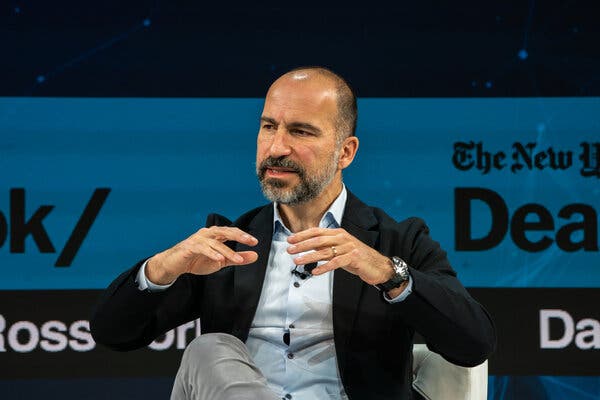
Uber drivers and food delivery couriers should get priority access to the coronavirus vaccine, Dara Khosrowshahi, Uber’s chief executive, wrote in a letter to the governors of all 50 states.
Arguing that drivers had served as a “lifeline” during the pandemic by delivering food and transporting health care workers, Mr. Khosrowshahi said that they had earned a spot near the front of the vaccination line alongside other kinds of frontline workers.
“As you finalize your state-level allocation and distribution plans, I encourage you to recognize the essential nature of their work,” Mr. Khosrowshahi wrote to the governors. “I want to ensure these individuals can receive immunizations quickly, easily and for free.”
He also offered to use Uber’s app to promote the vaccine and said Uber could be used to help people get to vaccination appointments.
The Centers for Disease Control and Prevention has recommended that health care workers who are at risk of contracting the virus and residents of long-term care facilities should be the first people to receive the vaccine.
Essential workers should be next, the C.D.C. suggested. But individual states have varied definitions of which workers meet the criteria. Uber drivers should be considered in that phase, Mr. Khosrowshahi said.
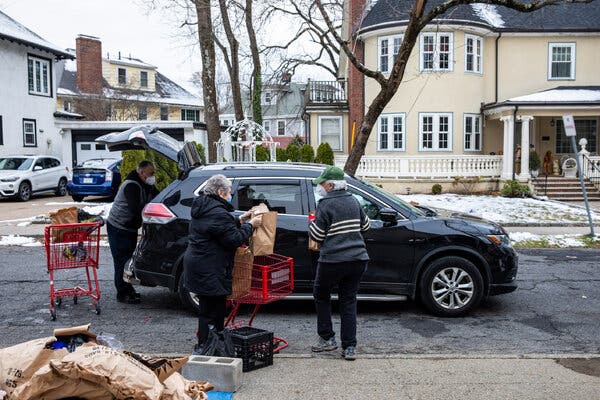
Millions of Americans will lose their only income in a few weeks if Congress doesn’t act soon to extend unemployment benefits.
Congress created two programs in the spring to expand the unemployment safety net: Pandemic Emergency Unemployment Compensation, which offers 13 weeks of payments to people whose regular state benefits have run out, and Pandemic Unemployment Assistance, which is intended for people left out of the regular unemployment insurance system. But the week ending Dec. 26 is the last for which people can claim benefits under the programs.
Figuring out how many people stand to lose benefits is surprisingly difficult. Data from the Labor Department on Thursday showed that 4.5 million people were enrolled in the program to extend state benefits as of the third week of November. That was down slightly from a week earlier but had been rising quickly as people exhaust their regular benefits, which last six months in most states. If the program ends, some people will qualify for a separate federal extended benefits program, but that extension isn’t available in all states.
Pandemic Unemployment Assistance is even more complicated. The report on Thursday showed that 8.6 million people were enrolled, but that figure is almost certainly an overestimate. A recent report from the Government Accountability Office found that the program had been plagued by fraud and double counting, rendering the data unreliable.
By any accounting, however, millions stand to lose their income if the programs end. Many have already drawn down savings, leaving them with little financial cushion and putting them at risk of eviction or foreclosure.
“They’re going to be very quickly forced to make a lot of bad financial decisions to put food on the table,” said Andrew Stettner, a senior fellow at the Century Foundation, a progressive group. “It can be something you can’t recover from or that takes years to recover from.”
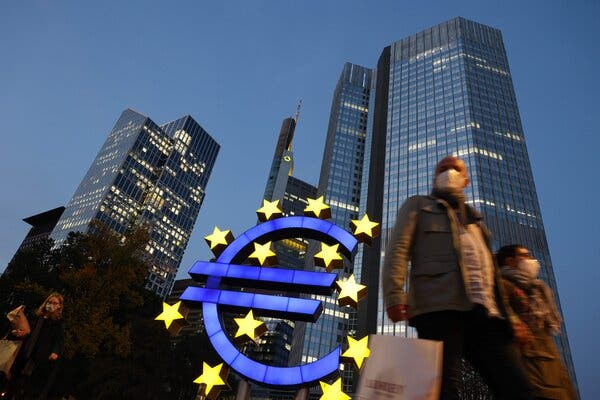
The European Central Bank administered another dose of stimulus to the eurozone economy on Thursday, as policymakers signaled that they expected the impact of the pandemic to linger into 2022 even as the rollout of vaccines begins.
The bank’s Governing Council, which met on Wednesday and Thursday, extended and enlarged programs intended to keep borrowing costs low for eurozone businesses and consumer.
The bank said it would increase pandemic-related bond buying — essentially a money-printing program — by 500 million euros, to a total of €1.85 trillion euros, or $2.2 trillion. The bank said it expected to continue the purchases at least until March 2022, nine months longer than planned.
The central bank also extended by a year, to June 2022, an initiative that allows commercial banks to borrow money at negative interest rates, provided the banks pass the credit on to their customers.
The decisions indicate that the European Central Bank’s Governing Council believes economic recovery is still months away, and extraordinary measures are needed to blunt the damage caused by the pandemic.
A second wave of coronavirus infections provoked a renewed economic downturn in the last quarter of this year, prompting the bank to take action, Christine Lagarde, the president of the European Central Bank, told reporters during a news conference.
The most recent analysis by central bank economists suggests “a more pronounced near-term impact of the pandemic on the economy and a more protracted weakness in inflation than previously envisaged,” Ms. Lagarde said.
The new burst of stimulus was not a surprise after Ms. Lagarde telegraphed policymakers’ intentions at a news conference in October, and repeated the message several times afterward. The only unknowns were what precise form the stimulus would take, and how big it would be.
The measures announced Thursday were in addition to 1.35 trillion newly created euros that the central bank had allocated to buy government and corporate bonds. The purchases are a way of pushing down market interest rates to keep borrowing costs low.
Since April, the central bank has also been lending to commercial banks at interest rates as low as minus 1 percent, in effect paying lenders to take the money as a way of pumping credit into the economy. The commercial banks must lend the money to their customers and meet other conditions to qualify.
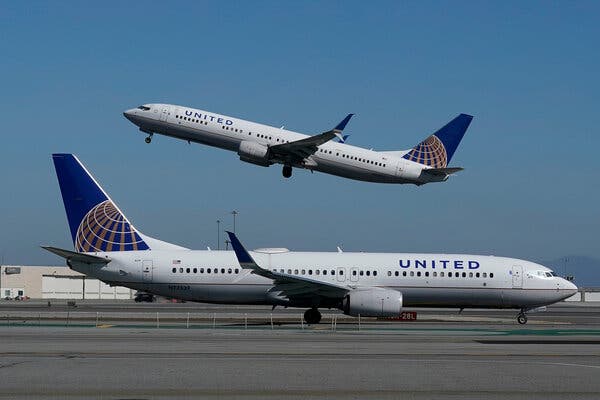
United Airlines said on Thursday that it planned to reduce its greenhouse gas emissions to zero by 2050, in part by investing in capturing and storing carbon.
The airline said it had agreed to invest in 1PointFive, a joint venture between a subsidiary of Occidental Petroleum and Rusheen Capital Management, a private equity firm. That venture plans to build large plants in the United States where carbon will be captured from the air and permanently stored deep underground. Each plant will be designed to remove a million tons of carbon dioxide a year, or the equivalent of the carbon removed by about 40 million trees, according to the airline.
United is among a growing list of companies to promise to effectively eliminate their contribution to climate change. Airlines face a particularly difficult challenge because the technology to produce a zero-emission jet that can economically ferry hundreds of people over long distances does not yet exist and may not for decades.
Some experts and corporate leaders, including United’s chief executive, Scott Kirby, said the world would not be able to meet its climate goals without capturing carbon dioxide in the air and storing it in perpetuity. The approach is technically feasible, but it is expensive and has yet to be deployed on a large scale.
“Everyone that really wants to get the globe down to zero is going to have to come to grips with direct capture and sequestration because that is going to be the only way to get there by 2050,” Mr. Kirby told reporters on a call on Wednesday.
To meet its goal, United also plans to invest in the development and use of “sustainable fuel” and undertake other measures. American Airlines recently announced a similar pledge to achieve net zero carbon emissions by 2050, and Delta Air Lines said this year it would invest $1 billion to become the world’s “first” carbon neutral airline.
-
Stocks drifted between gains and losses on Thursday, as new data showed that unemployment claims jumped sharply in the United States last week, and the European Central Bank’s plans to expand stimulus measures fell short of what some traders were expecting.
-
The S&P 500 fell half a percent in early trading before recouping those losses. The Stoxx Europe 600 slipped about 0.8 percent, while the FTSE 100 index in Britain was flat after giving up its early gains.
-
The Labor Department said on Thursday that more than 947,000 workers filed new claims for state unemployment benefits last week, up nearly 229,000 from the week before. Applications have now risen three times in the last four weeks.
-
The report highlights the importance of a new economic stimulus plan to shore up households and businesses as the pandemic grinds on. Prospects for a new round of federal help have grown in recent days, with the White House proposing its own $916 billion spending plan on Tuesday. But lawmakers remain far apart on key issues.
-
The E.C.B., which has bought more than 600 billion euros’ worth of European bonds as part of an effort to keep government borrowing costs low, said on Thursday that it would increase its bond-buying plan by 500 billion euros and keep purchasing the debt until at least March 2022.
-
The pound fell against all other major currencies, losing 0.9 percent against the euro and 0.6 percent against the dollar, after Prime Minister Boris Johnson of Britain returned from Brussels without a breakthrough on Brexit trade talks with the European Union. The two sides have set a new deadline of Sunday to secure a deal.
-
On Wednesday, Britain signed trade agreements with Singapore and Vietnam. Britain has rushed to sign dozens of free-trade agreements with countries because on Jan. 1 it will be independent of the European Union customs union. The agreements essentially replicate the terms of the E.U. pacts with those countries.
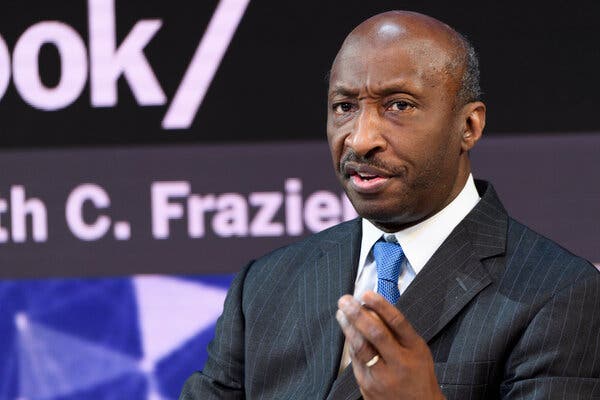
Jarred by the death of George Floyd and the issues of racial injustice raised in its wake, the chief executives of three dozen companies are starting an initiative to provide a million jobs for Black workers in the next decade.
The effort, called OneTen, is led by Merck’s chief executive, Kenneth C. Frazier, and IBM’s executive chairman, Ginni Rometty. It includes leaders at 37 companies like American Express, AT&T, Bank of America, Cisco, Delta Air Lines, General Motors, Johnson & Johnson, Nike, Stryker, Target and Wal-Mart.
The companies hope to draw in a more diverse community of workers through a recruiting start-up that will identify potential job applicants with the help of community colleges, nonprofit groups, and other organizations known for cultivating Black talent.
Organizers said the jobs would have a wide range, from nurse practitioners to roles relying on specialized technology skills. The hope, they said, is to put more Black employees into better-paying, more secure jobs that will help sustain working families and provide better access to the upper echelons of corporations.
“The primary creator of wealth in the United States is the private sector,” Mr. Frazier said. “We can rebuild our country coming out of this pandemic. And if private companies decide that they’re going to hire, as we rebuild our economy, with an equity lens, then we’ll change the country.”
Mr. Frazier, one of only a few chief executives in the Fortune 500 who is Black, said the OneTen effort began after the killing of Mr. Floyd last May by a Minneapolis police officer. The event set off angry protests over racial inequities and “soul searching” in corporate America as well, Mr. Frazier said.
Talking with other chief executives, business organizations and Ms. Rometty, who has emphasized the importance of a diverse work force at IBM, Mr. Frazier said he came to believe that, as employers, their best tool for combating systemic racism was to attract new Black talent into well-paying jobs at their companies. Given that only about 22 percent of Black people over the age of 25 in the United States have attained a bachelor’s degree — a markedly lower percentage than white and Asian people — Mr. Frazier and Ms. Rometty said that drawing more Black talent would probably require dropping certain college-education requirements.
“As an employer, if I state that every job has to have a college degree, I am predetermining the outcome,” said Ms. Rometty. “The talent is out there; I must find another pathway for it to come to me.”
OneTen — the name refers to hiring one million workers in 10 years — is set to begin its work in January. A chief executive has not yet been named.
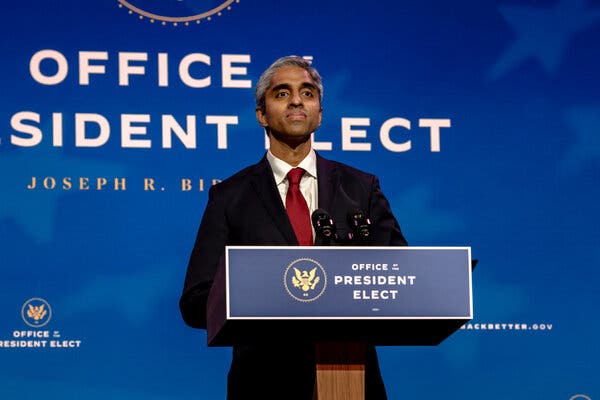
President-elect Joseph R. Biden Jr.’s choice for surgeon general, Dr. Vivek H. Murthy, had a central role in the National Collegiate Athletic Association’s decision in March to cancel this year’s national basketball tournaments — one of the earliest and most culturally significant signs that the virus would upend ordinary life in America.
The work of Dr. Murthy, a member of the association’s powerful Board of Governors who was surgeon general during part of the Obama administration, offers a view into how he approached the pandemic’s initial threat in the United States, and how he might help shape the federal government’s response under Mr. Biden.
A newcomer to the insular world of college athletics, Dr. Murthy proved a cautious, deliberate expert who was wary of making drastic decisions prematurely, interviews with more than a dozen people who participated in the N.C.A.A.’s meetings suggest. But they said that as the tournaments approached and more data and scientific research emerged, Dr. Murthy was a forceful and effective champion of measures that had been unthinkable to most of society only days or weeks earlier.
Indeed, it was Dr. Murthy who urgently told board members that they risked fueling a deadly crisis if they allowed the tournaments to proceed as scheduled.
“He was instrumental in convincing the board that the time to act was now,” said Kenneth I. Chenault, a former chairman of American Express who sits on the N.C.A.A. board.
But board members like Mr. Chenault said that it was plain that Dr. Murthy understood the cultural and financial repercussions of a decision like canceling the basketball tournaments, which generate hundreds of millions of dollars.
-
The Trump administration announced Wednesday that it was filing a challenge to measures that Canada uses to protect its dairy market, the first enforcement action taken under a new trade agreement that the countries agreed to last year. Under the terms of the United States-Mexico-Canada Agreement, which replaced the North American Free Trade Agreement this year, the United States and Canada will now enter consultations, and if the issue isn’t resolved the United States can request a special panel be formed to examine the matter.
-
Starbucks announced on Wednesday that Mellody Hobson will be the next non-executive chair of the company’s board, as the coffee chain moves closer to its goal of increasing diversity among its leadership. One of the most senior Black women in finance, Ms. Hobson has served on the board for 15 years and will step into the new role in March. She will replace Myron Ullman III, who has served as chair since 2018 and is retiring.






